Ben Lowry: There has been a moral collapse '“ there is no will to confront IRA terror, past or present
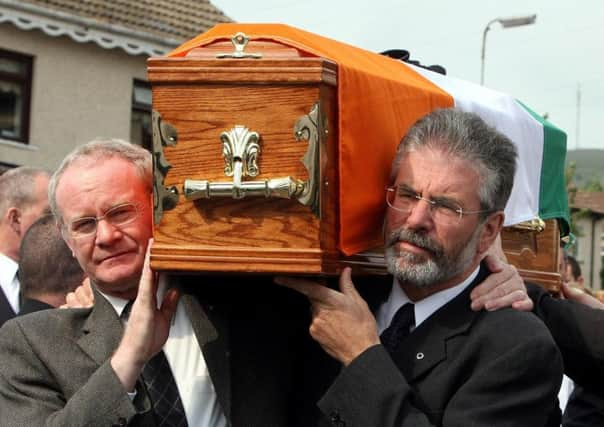

How can the trial of elderly soldiers for Troubles offences be stopped other than through a general amnesty for everyone including the IRA?
I imagine it is hard to put a halt on one without the other, as republicans must know – and the government too.
Advertisement
Hide AdAdvertisement
Hide AdThere is another route of course, which is large scale prosecution of IRA terrorists, but there is no hint of that coming.
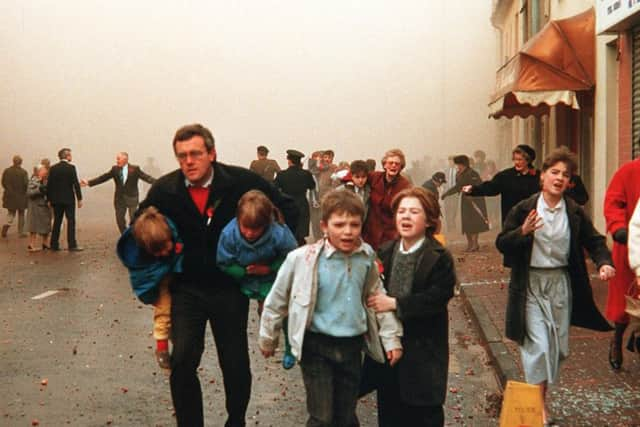

We have suffered a moral collapse.
By ‘we’ I mean the bulk of the population in Northern Ireland, who rejected IRA mayhem but who are mute about this legacy scandal.
The first major election Sinn Fein contested was the 1982 Assembly poll. They got 10.1% of the overall vote, which is was a third of the 30% of votes that went to any nationalists (but Sinn Fein in fact got an even smaller percentage of the Catholic vote – as explained in footnote below).
The year after the hunger strikes, when tensions were still high, there was an overwhelming repudiation of the IRA.
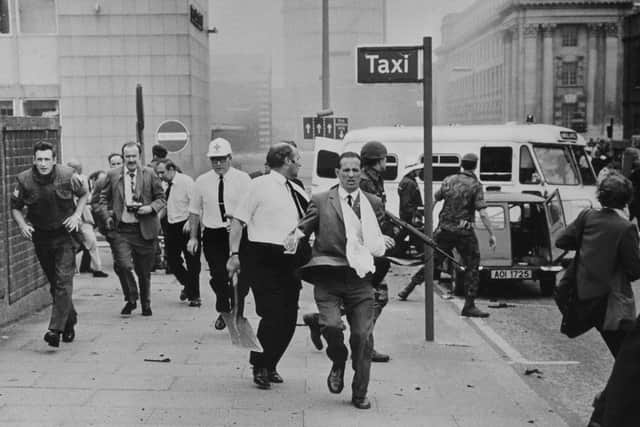

Advertisement
Hide AdAdvertisement
Hide AdNow Sinn Fein has a clear majority of nationalist votes. But a much larger group of people now seem to think that the security forces and the IRA were equally bad.
In other words lots of people now have a more indulgent view of the IRA than they had when the bombs were actually exploding.
Even some pro-Union commentators will furrow their brows and talk gravely about how murky it all was on both sides during the Troubles.
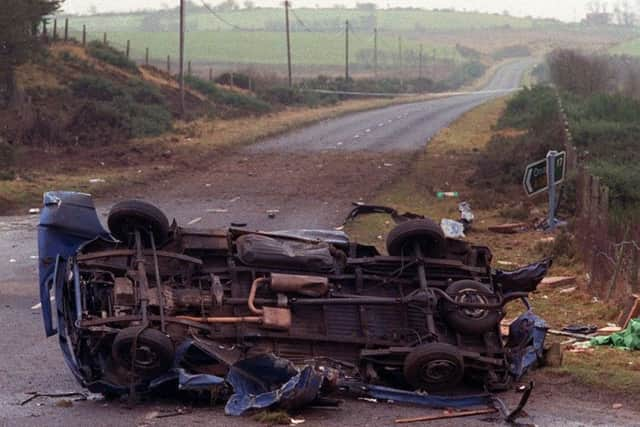

Advertisement
Hide AdAdvertisement
Hide AdWhen people of a unionist background talk in this way they often seem to think that they are showing how open-minded they are.
The problem is that it is nonsense.
There were certainly illegal killings by the British state but it was notably restrained in its overall response to IRA terror.
It is not hard to prove so. There is much talk now about the importance of literacy and numeracy, but the latter is in short supply when it comes to examining what happened in the Troubles.
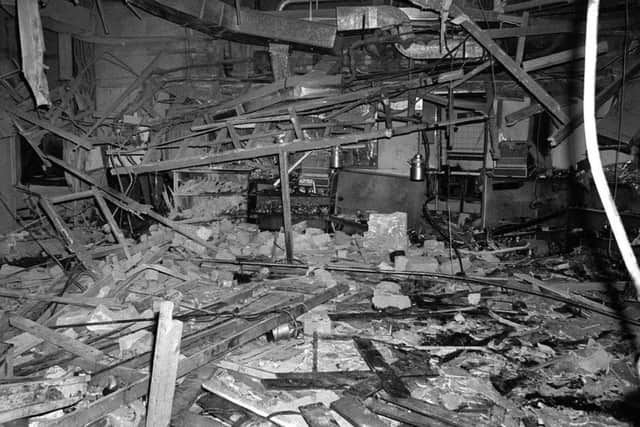

The numbers are not difficult. Almost 2,100 people were killed by republicans, and half that number killed by loyalists. Around 360 were killed by the security forces.
Advertisement
Hide AdAdvertisement
Hide AdIf the state had been very tough, a determined terrorist campaign causing 2,100 deaths would have been crushed with many more deaths in response, perhaps 5,000 or 10,000.
That would not only have been morally unacceptable but strategically disastrous.
Look how the justifiable outrage at the shameful killings at Bloody Sunday inflamed and worsened the Troubles.
If Britain had been ruthless and had killed people at will there would not have been only 2,000 republican killings – there would have been many more, because such British ruthlessness would have enraged and radicalised the whole island.
Advertisement
Hide AdAdvertisement
Hide AdThere might instead have been, say, 10,000 republican killings, leading perhaps to 40,000 or more unionist-state killings in revenge and so on, spiralling ever upwards.
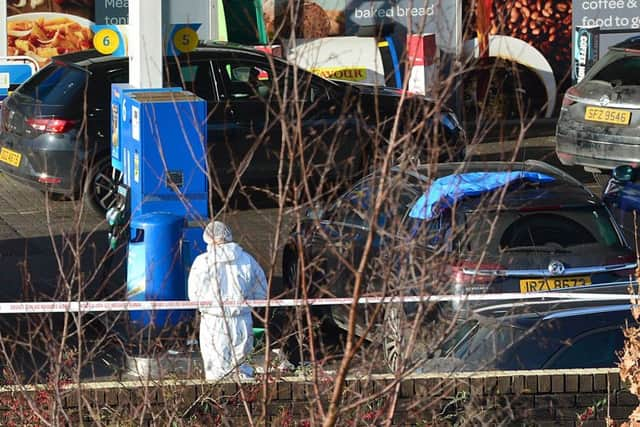

We would have been far into civil war, as has erupted in many parts of the world.
But it didn’t happen here.
The more I see and read of the world the more convinced I am that barely any country on earth would have reacted with the restraint Britain did to such a sustained terror campaign.
The striking thing about loyalists is how bad their intelligence was, how rarely they killed republicans and how often they murdered innocent Catholics.
Advertisement
Hide AdAdvertisement
Hide AdPerhaps the biggest single source of the increasingly benign moral view of the IRA is the sweeping definition of collusion, which implies a murderous UK state (ie a state that it would be justified to resist through force).
• See link to article below challenging definition of collusion
When in debates I ask why, if there was as much collusion as is alleged, IRA leaders were so rarely killed, no republican challenges me and says that such leaders were in fact killed (of course they do not say that, because IRA leaders were in fact routinely acquitted by courts if they were even charged).
Republicans do say: “Ah, the Brits knew not to kill the leaders so they killed people further down.”
Advertisement
Hide AdAdvertisement
Hide AdBut they didn’t. Surprisingly few IRA at any level were killed.
So if you combine the fact that the mountain of loyalist victims was mostly made up of innocent Catholics, and you accept the allegation that collusion was widespread, then it must be the case that the state, for some extraordinary and grotesque reason, did not want IRA to die but did want innocent Catholics to die.
Sure enough this is a conspiracy theory that some people do indeed believe.
They are told of collusion at Loughinisland and, it seems on the 25th anniversary of the Sean Graham massacre, possibly there too. Both heinous crimes against humanity targeting Catholic civilians, all pointing ultimately to the state, allegedly.
Advertisement
Hide AdAdvertisement
Hide AdMeanwhile there was an ombudsman investigation into RUC failures in the Good Samaritan bomb in Londonderry and nothing – nowt, zilch – on the IRA people who planted and ordered that bomb.
And meanwhile, elderly soldiers face trial for fleeting decisions made in tense situations that they never asked to be in. But there are no impending trials, or even seemingly arrests of, the people who orchestrated decades of terror.
Nor are there arrests for the IRA crimes against humanity at Enniskillen, La Mon, Teebane, Birmingham, Bloody Friday, Harrods and so on.
This is what happens when you imply a degree of state brutality that was never there.
Advertisement
Hide AdAdvertisement
Hide AdThe BBC led their bulletins on Thursday night with a finding that ‘only’ 30% of legacy investigations are into state killings. This was reported as seeming to disprove any legacy imbalance.
But that means almost all 360 or so state killings are being investigated, even though many were clearly legitimate – most seem not even to be in dispute.
Even if half of the killings are in dispute, almost all were what Americans would call Murder Two (not pre-meditated, like Murder One – all terrorist killings).
So if the state is responsible for 5% of disputed deaths (I think less), almost none pre-meditated, and given that three soldiers now face trial, then almost 100 terrorists should be facing the same.
Advertisement
Hide AdAdvertisement
Hide AdBut the BBC report did not ask: if the legacy investigations are in fact balanced, as was its interpretation of its new data, then why are there so few prosecutions of the main perpetrators?
But perhaps the BBC felt it had answered that the week before, when it merely asked the DPP if there was an imbalance and he assured them there was not – an interview which also led bulletins.
Many people, still high hundreds of thousands in number, have enough memory of the Troubles to know who did what. But they don’t have the energy to combat the republican narrative.
This fatigue also explains why there is only muted outrage at the lenient sentencing and bail policy that this newspaper has been highlighting since well before Damien Joseph McLaughlin absconded.
Advertisement
Hide AdAdvertisement
Hide AdIf we allow a retrospective moral fog to envelop a PIRA campaign that the community rejected at the time, it is no surprise if many people treat dissident crime as akin to a serious motoring offence.
But millions of people in GB will begin to pay attention when elderly soldiers go to court.
You will see more things such as the private action that the News Letter is backing against the 1971 IRA murderers of the trio of Scottish soldiers (see page 6 of print edition or click here).
• Ben Lowry (@BenLowry2) is News Letter deputy editor
Advertisement
Hide AdAdvertisement
Hide Ad• Footnote on 1982 election: The Sinn Fein vote was 10.1%. The combined nationalist vote was 29.2%. The Workers Party vote was overwhelmingly in nationalist areas, so if we conservatively estimate that 20% of the Alliance vote came from voters of a Catholic background, then around 34% of the overall votes were cast by people from a Catholic background